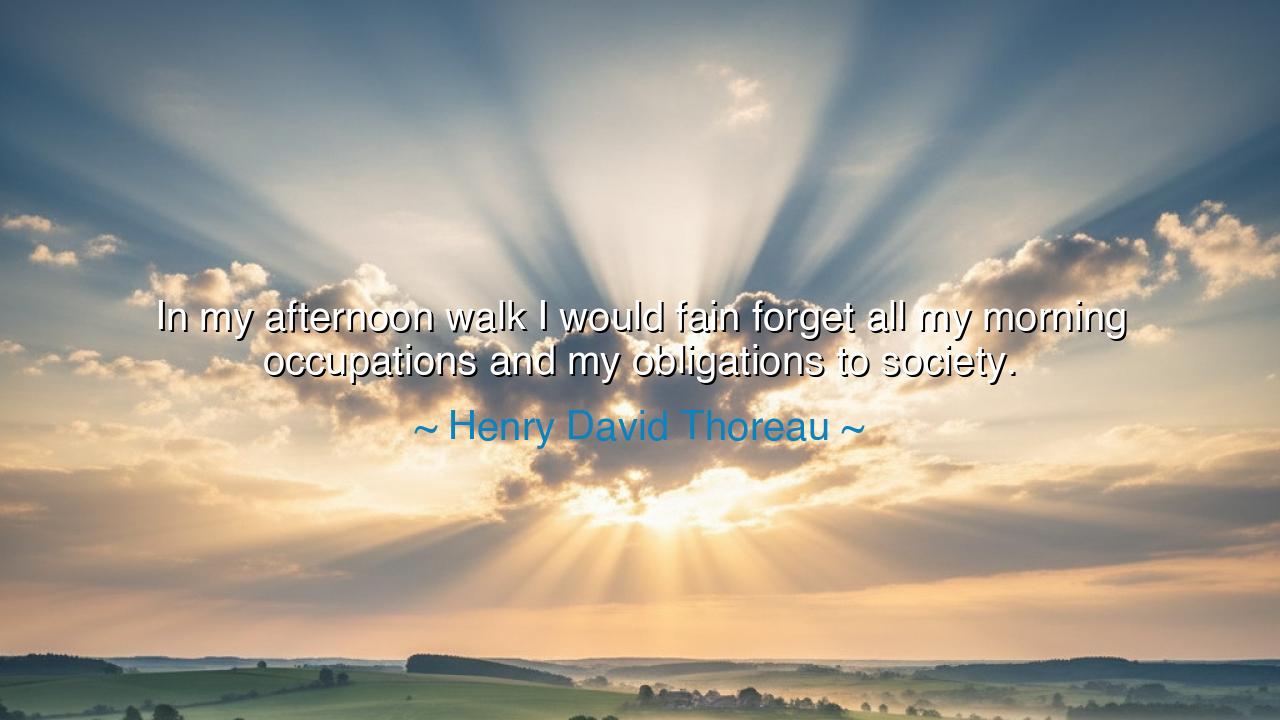
In my afternoon walk I would fain forget all my morning
In my afternoon walk I would fain forget all my morning occupations and my obligations to society.






The prophet of simplicity, Henry David Thoreau, once confessed in his journals these tender words: “In my afternoon walk I would fain forget all my morning occupations and my obligations to society.” In this utterance, Thoreau reveals the ancient human longing to shed the weight of duty, to step away from the noise of commerce and responsibility, and to return, if only for a while, to the embrace of nature, where the soul breathes freely. His words are not a rejection of society itself, but a cry for balance: that man must sometimes forget his labor in order to remember his life.
For the morning occupations are the endless duties of the world—the tasks of survival, the obligations of trade, the demands of others upon our time. They chain the spirit to routine, and though they may be necessary, they also weary the soul. The afternoon walk, however, is the sanctuary of the self: the path into the woods, the open air, the song of birds, the silence of fields. It is there that Thoreau sought not to serve society, but to serve his own spirit, to rediscover what is eternal and unbroken within.
This desire has burned in the hearts of men throughout history. Consider the Roman statesman Cicero, who after long hours of duty in the Senate, would retreat to his gardens to walk, to read, to write. In those moments he left behind the obligations of empire and returned to the realm of thought and reflection. It was in such walks that philosophy flowered, for in stepping away from the burdens of society, he found the space to see clearly. So too did Thoreau, in the woods of Concord, lay aside his obligations in order to find truth in solitude.
Thoreau’s words echo most powerfully in his great experiment at Walden Pond, where he sought to cast off the endless demands of society and live simply, close to nature. There, every walk was an escape and a discovery. He proved by his life that man does not need to be forever bound by obligation, but can choose to step away, to forget for a moment the chains of duty and instead remember the eternal rhythms of earth and sky. His walks became acts of quiet rebellion, affirming that the soul is not owned by society, but belongs first to itself and to nature.
The meaning of this quote is therefore both gentle and heroic: to forget obligations is not to shirk them forever, but to set them down for a time, lest they consume the soul. Without such forgetting, man becomes nothing but a servant of society, his spirit dulled by constant toil. With such forgetting, he remembers that he is more than a worker, more than a citizen—he is a being of wonder, meant to walk freely beneath the sky.
The lesson for us is urgent: in the age of endless occupation, where morning duties stretch long into the night, we too must take our afternoon walks. We must dare to forget, if only for a moment, the burdens that press upon us, and step outside into silence and simplicity. For in that forgetting, we remember what is real. In that silence, we hear again the voice of the soul. Without such walks, life becomes a prison; with them, life becomes a song.
Practical wisdom flows: make time each day, however brief, to step away from your obligations. Walk in a quiet place. Leave behind your tasks, your devices, your noise, and let your mind empty. Let your heart be cleansed by the sight of the sky, the touch of the wind, the sound of the earth beneath your feet. Do this not as an escape from responsibility, but as a renewal of strength, so that when you return, you carry not only duty but joy.
So let Thoreau’s words echo within you: “In my afternoon walk I would fain forget all my morning occupations and my obligations to society.” Let them remind you that you are not only what you do, nor only what society demands, but something greater—something that needs time, silence, and nature to flourish. Forget for a while, so that you may remember forever.






AAdministratorAdministrator
Welcome, honored guests. Please leave a comment, we will respond soon